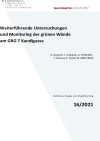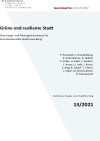Suchergebnisse
50 grüne Häuser - Entwicklung und Demonstration eines Low-Tech-Grünfassadensystems
Entwicklung einer kostengünstigen gewerke- und prozessübergreifenden All-In Gebäudebegrünung inkl. Wartungskonzept ("Greening-Toolkit") zur breiten (vor allem straßenseitigen) Implementierung auf Fassaden im städtischen Bestand, kombiniert mit einer Prozessinnovation zur Vereinfachung aller notwendigen Abstimmungsprozesse.
Green and Resilient City - Management and planning tools for a climate-sensitive urban development
The aim of the project was to provide a "proof of concept" of a control loop and tool set for the management, optimization and evaluation of green and climate-sensitive urban (district) planning- The tool set consist of urban and open space planning instruments as well as climate simulations at different scale levels.
Green facades with moss plants
Development of moss-covered facade panels by selecting and testing of appropriate moss species, new water storage and adhesive substratum, Materials of the support panels and technical construction details, for year-round green, sustainable, maintenance friendly, affordable building facades
VERTICAL FARMING - Ermittlung der Anforderungsbedingungen zur Entwicklung eines Vertical Farm Prototyps zur Kulturpflanzenproduktion
Im Mittelpunkt stand die Erforschung von Grundlagen für eine neue Gebäudetypologie, der Vertikalen Farm. Urbane vertikale Lebensmittelproduktion kann zur Steigerung der Energieeffizienz von und zur Reduktion des Landverbrauchs durch Städte beitragen. Wesentliche Einflussfaktoren zur Erreichung dieser Ziele werden durch diese Grundlagenforschung offen gelegt.
Grüne und resiliente Stadt - Steuerungs- und Planungsinstrumente für eine klimasensible Stadtentwicklung
Ziel des Projekts war ein „Proof of Concept“ eines Regelkreises und Tool-Sets zur Steuerung, Optimierung und Evaluierung einer grünen und klimasensiblen Stadt(teil)planung bestehend aus städtebaulichen und freiraumplanerischen Instrumenten sowie Klimasimulationen auf unterschiedlichen Maßstabsebene.
Weiterführende Untersuchungen und Monitoring der grünen Wände am GRG7 Kandlgasse

Anknüpfend an das abgeschlossene Forschungsprojekt „GrünPlusSchule“, in dessen Rahmen verschiedene Begrünungsmaßnahmen an und in einer Schule im 7. Wiener Gemeindebezirk (GRG7) umgesetzt werden konnten, greift das vorliegende Folgeprojekt weitere offene Fragen auf und widmet sich detaillierten Messdatenauswertungen zu den Auswirkungen der Innen- sowie Außenbegrünungen.
Schriftenreihe
16/2021
A. Korjenic, J. Hollands, A. Pichlhöfer, T. Gonaus, E. Sesto, M. Mitterböck
Herausgeber: BMK
Deutsch, 98 Seiten
Downloads zur Publikation
Grüne und resiliente Stadt - Steuerungs- und Planungsinstrumente für eine klimasensible Stadtentwicklung

Ziel des Projekts war ein „Proof of Concept“ eines Regelkreises und Tool-Sets zur Steuerung, Optimierung und Evaluierung einer grünen und klimasensiblen Stadt(teil)planung bestehend aus städtebaulichen und freiraumplanerischen Instrumenten sowie Klimasimulationen auf unterschiedlichen Maßstabsebene.
Schriftenreihe
13/2021
F. Reinwald, C. Brandenburg, P. Hinterkörner, B. Hollósi, C. Huber, A. Kainz, J. Kastner, F. Kraus, U. Liebl, J. Preiss, Z. Ring, B. Scharf, T. Tötzer, J. Züger, M. Žuvela-Aloise, D. Damyanovic
Herausgeber: BMK
Deutsch, 124 Seiten
Downloads zur Publikation
Sondierung für die Entwicklung von moosbewachsenen Gebäudefassadenpaneelen (BE-MO-FA)
Sondierung für die Entwicklung von moosbewachsenen Fassadenpaneelen durch Auswahl und Erprobung von geeigneten Moosarten, neuen Feuchtespeicher- und Haftsubstraten, Materialien für Tragpaneele und hochbautechnischen Konstruktionsdetails Für ganzjährig grüne, dauerhafte, pflegeextensive und kostengünstige Gebäudefassaden.
GrünPlusSchule@Ballungszentrum - Hocheffiziente Fassaden- und Dachbegrünung mit Photovoltaik Kombination; optimale Lösung für die Energieeffizienz in gesamtökologischer Betrachtung
Im Rahmen dieses Projektes wurden an einer Wiener Schule unter Einbindung von SchülerInnen, unterschiedliche Gebäudebegrünungs-Systeme und Pflanzen-/Substratarten, kombiniert mit verschiedenen PV-Modulen, untersucht und ihre Einflüsse auf das hygrothermische Verhalten der Gebäude, Energiesparpotential, Raumluftqualität, Luftfeuchtigkeit, Beschattung, Lärmminderung, Wasserrückhaltung und des Wärmeinseleffekts wissenschaftlich erläutert.
GreenPlusSchool@urban - Highly efficient facade and roof greening in combination with PV; optimal solution for energy efficiency in overall environmental consideration
In this project, different building-greening systems and plant/substrate types, combined with various PV modules, had been examined on a Viennese school. The influence on the hygrothermal behaviour of the building, energy-saving potential, humidity, shading, noise reduction, water retention and heat island effect are being scientifically explained. The students of the school will also be involved.
KELVIN - Reduktion städtischer Wärmeinseln durch Verbesserung der Abstrahleigenschaften von Gebäuden und Quartieren
Potentialabschätzung einer möglichen Abschwächung des Auftretens städtischer Wärmeinseln durch die Veränderung der Oberflächenalbedo unterschiedlicher Stadtstrukturen (Boden, Dachflächen, Dachbegrünung etc.) bzw. damit verbundener Energieeinsparung durch Reduktion des Kühlungsbedarfs und Emissionsreduktion, um positive Auswirkungen auf Gesundheit und Lebensqualität (Human- und Wohnkomfort) in Städten zu ermöglichen.
